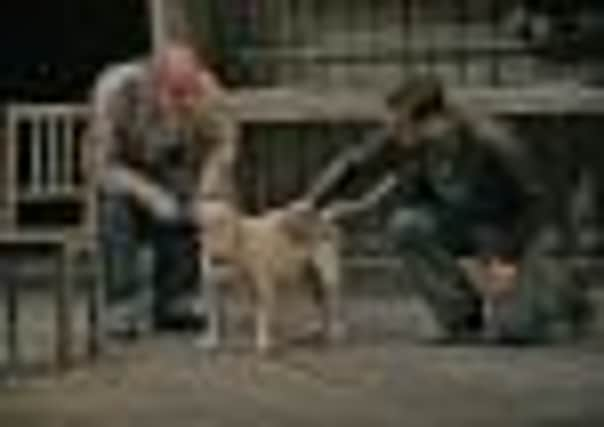Theatre reviews: Of Mice and Men | Serov’s People


Of Mice and Men, Royal Lyceum Theatre Edinburgh
Rating: ****
TODAY, a life without fame or celebrity seems like a living death, to many young people; but there was a moment, back there in the mid-20th century, when being an ordinary guy or girl didn’t seem such a bad option. It was partly a reaction to the horrors of war, that made the suburban nine-to-five look like a kind of heaven; it also had to do with the upbeat energy of postwar economic growth.
It was also, though, partly a political response to the 1930s, and to an economic depression so severe that working people often had to stand up and fight for their lives, acquiring a sense of dignity and mutual respect in the process. Aaron Copland’s iconic Fanfare For The Common Man was composed in 1942, as the United States emerged from the deepest recession in its history; and John Steinbeck’s play-novella Of Mice And Men – now revived in a quietly magnificent production by John Dove, at the Royal Lyceum – belongs to the same period, emerging in 1937 from Steinbeck’s bitter experience of the lives of itinerant farm workers in his native California.
Advertisement
Hide AdUnlike Steinbeck’s The Grapes Of Wrath, though, Of Mice And Men does not deal directly with questions of economy and politics, although they make a powerful backdrop to the story. Instead, it offers what Wordsworth called “the still, sad music of humanity”; a profound and beautiful reminder of why every human being matters, and why our deepest duty is to try to build a world where people are valued and cherished, rather than punished and destroyed for every weakness they show.
George and Lennie, Steinbeck’s two central characters, are two itinerant farmworkers from the same small town, bound together by the simple fact that Lennie – though a giant in physical strength – is more a child than a man, very simple in his understanding, and that George therefore feels responsible for him. In an economic world where male farmworkers have increasingly become lone travellers, unable to support any bonds of family or affection, their very friendship is seen as strange. And because Lennie is not sharp enough to suppress his human needs for comfort and affection as the other men have learned to do, the story is driven from the start by a profound sense of looming tragedy, and of Lennie’s vulnerability to a terrible, scapegoating violence.
John Dove’s production – graced by two fine leading performances from William Ash as George, and Coronation Street actor Stephen Jackson as Lennie – absolutely avoids any flashy interpretation of Steinbeck’s work. Colin Richmond’s farm-shed set is a model of restrained effectiveness, Jeanine Davies’ lighting is quietly beautiful. Like all of John Dove’s Lyceum productions of mid-20th-century classics, though, this Of Mice And Men offers the kind of profound theatrical intelligence and feeling that is often absent from flashier shows. There is never a moment when the positioning of the actors jars against the needs of the story; never a moment when the actors themselves – including a fine range of Scottish-based talent, in supporting roles – seem less than fully aware of the meaning of the story they tell, or of the need to deliver it to the audience with uncluttered clarity and energy.
And the result – without fireworks or self-advertisement – is a theatrical experience that is sometimes almost overwhelming in its sheer storytelling power. We live in a changed world, from the one inhabited by George and Lennie. Yet at the core our dilemmas are the same, and in George’s daily choice between the demands of a ruthless system, and the tug of human love and obligation we see a painful truth about our own lives, addressed with a passionate, straightforward humanity that often puts contemporary writers to shame.
Serov’s People, Glasgow Oran Mor
Rating: ***
There’s no lack of humanity, of course, in Peter Arnott’s new Play, Pie and Pint show Serov’s People, this week’s lunchtime offering at Oran Mor. When it comes to straightforward theatrical energy, though – well, Arnott is never a man to attempt one clever idea when three will do. His latest play is inspired by the work of Valentin Serov, a Russian portraitist of the turn of the 20th century, whose beautiful and eloquent paintings capture the mood of an intelligent, good-looking, highly-cultivated Russian bourgeoisie at the moment when they began to sense that their way of life was doomed to collapse.
Typically, though, Arnott is not content to write a play about Serov’s work, with appropriate contemporary resonances. Instead, he sets up an immensely complex and none-too-dramatic situation in which we meet three figures in adjacent portraits not by Serov, but by a contemporary Scottish artist/curator who has been inspired by his work. The three pictures feature this painter himself – as well as his sister (portrayed sitting on a No 31 Edinburgh bus), and a friend of his called Charlie, who committed suicide in his early thirties.
Advertisement
Hide AdIt’s an understatement to say that all the dimensions of this play are difficult to grasp on first viewing; its structure seems all over the shop, and its preoccupations almost limitless, including the likely demise of the entire planet. In the end, though, there’s something irresistible about its vividness, its ambition, and the quality of the performances it draws from George Docherty as the painter, Jeanette Foggo as his sister, and Robert Jack as Charlie; although if Arnott does not soon find a director who can persuade him to knock his brilliant ideas into a slightly more legible shape, there’s a danger that his entire playwriting career will disappear, down an ingenious plughole of its own devising.
• Of Mice And Men runs until 17 March; Serov’s People until 25 February.